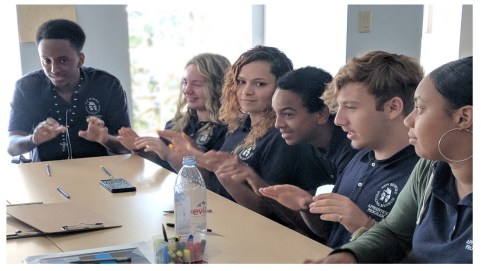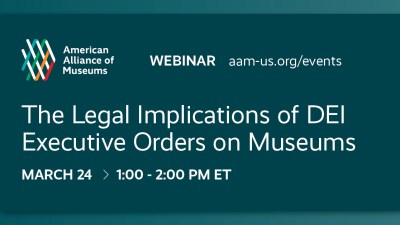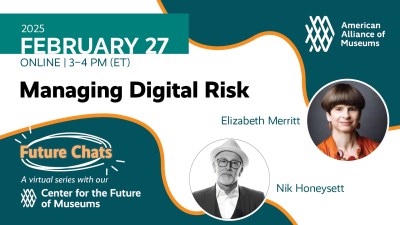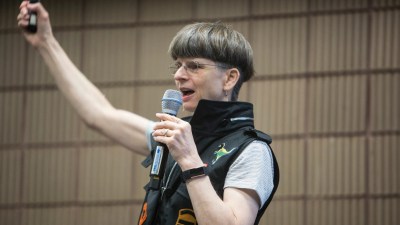
Each year AAM’s Education Committee (EdCom) Professional Network recognizes outstanding museum educators and supporters, programs and resources that exemplify excellence. The 2018 Award of Excellence in Programming was received by the New Bedford Whaling Museum for the High School Apprenticeship Program. This blog showcases their award-winning work with teens. We hope you enjoy their story and are inspired to nominate your own program for a 2019 EdCom award. Nominations for awards are now open until January 31, 2019.
On a typical afternoon during the school year, the New Bedford Whaling Museum high school apprentices saunter into the apprentice lab in small, staggered groups. The lab, which sits in a corner of the museum, serves as a meeting, working, snacking and celebrating location for the apprentices. The cubbies, the walls, the SpongeBob quotes on the whiteboard clearly give away that the space is occupied by high school students.
The first student arrives around 2:30 pm, his school finishes early and he gets a ride from his dad. Walking or taking the city bus, the others show up right before the 3:30 pm expected arrival time. However, no matter what time they show up, their energy is high, smiles and exhaustion hanging on their faces. The school day has run its course, sometimes in positive ways, other times in ways that remind us of the challenges often faced by students in the school setting. But no matter how they arrive, on a bus or on foot, after an accomplished day or a defeating one, they show up to the apprentice lab. They show up for each other. They show up because they’re excited about the afternoon’s activity or workshop. They show up because in their words, “this is the thing they were looking forward to the whole day.”
On this day, students will participate in writing workshop, one-on-one college counseling or prep for the Museum’s Halloween event. Perhaps surprisingly, the writing workshop is the group favorite. But before any of that happens, they gather around the table as a group. They play games, eat snacks, and talk about the highlights or frustrations of the day. They build and then they do.
Skip over related stories to continue reading articleThe official mission of the New Bedford Whaling Museum High School Apprenticeship Program is to provide resources and experiences that deepen community engagement, promote personal and professional development, and cultivate college and career readiness. Students enroll in the summer after their ninth grade year and commit to a three-year program. That’s the official description. Now, if you ask the apprentices what the Apprenticeship Program is or does, they’ll tell you the Apprenticeship Program is a place where they learn things about their city and the museum and then teach that information to others. They’ll also tell you about the other apprentices and how they are more like family than colleagues. They will most definitely tell you how “their” museum is the best because of KOBO (King of the Blue Ocean), the giant blue whale skeleton that hangs from the ceiling at the entrance of the museum. Finally, they’ll tell you that the Apprenticeship Program is definitely not just a program and it’s not a typical job. And even though they can’t quite define it, they want their friends to join. Plotting ways to recruit the next group of students months in advance of recruitment season is a weekly, if not daily routine.
In all ways, the students’ description of the program is more telling than its mission. It gets at what’s at the heart of the program’s most recent successes and recognitions including its most recent award, the 2018 AAM Education Committee Excellence in Programming Award—whatever the New Bedford Whaling Museum Apprenticeship Program is, whatever it will be, whatever it has the potential to accomplish, the apprentices own it, the apprentices create it, and the apprentices celebrate it.
And as the program creeps towards its 10th year anniversary in summer 2019, it gets at what makes the program so unique and so central to the Whaling museum: the apprentices will help define the program’s future and the future of their museum. Well, that’s if we step aside and let them.









Comments